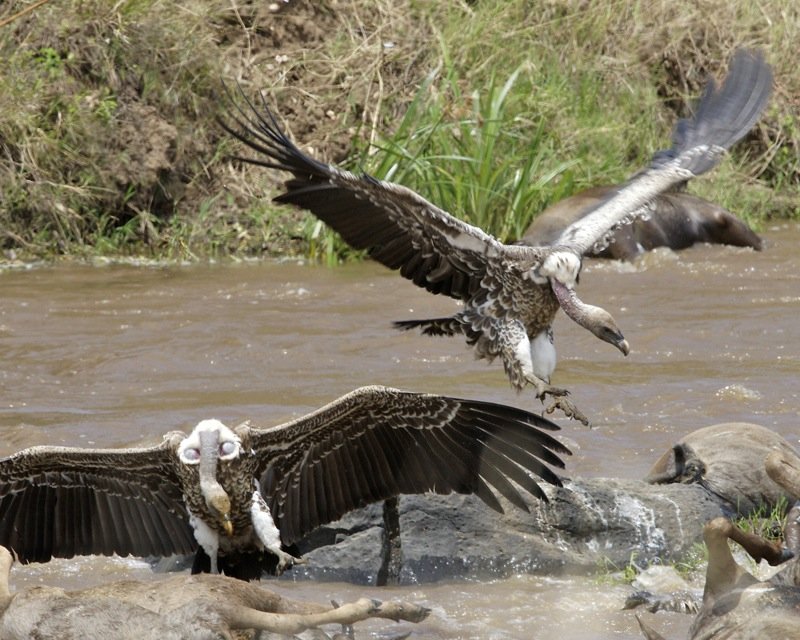Poisoned by poachers and herding locals, the vulture population in Masai Mara – the janitors of the wild – are fast disappearing from the skies of the African plains. The deaths are leaving no one to mop up the dead carcasses that are slowly turning the beautiful Savannah into a stinking death pit.
Every summer, 500,000 wildebeests plunge to their death during the treacherous migration from the Serengeti in Tanzania to the Masai Mara Reserve in Kenya, a phenomena recently declared a wonder of the world.
Traditionally, in the African wild, the deaths signaled a feast for vultures, not any longer.
During the recent migration, hundreds of thousands of wildebeests were trampled to death by their colleagues in the migration. The deaths were normal. The carcasses days after the event were not.
Anthony ole Tira, co owner of the local Matira bush camp said, “Ten years ago, this would have been cleaned by now. There are a lot of places along the Mara River that are not as clean as they once were because there are not enough vultures.”
Conservationists have reported that the total population of Pan African vultures has declined by over 62 per cent in 30 years, according to Dr Darcy Ogada from the Peregrine Fund. Seven of the vulture species had reportedly reduced by over 80 per cent.
Vultures in Africa are targeted by poachers and locals. The poachers poison carcasses of dead elephants and rhinos so as to kill the vultures which circle over the carcasses and signal park rangers. It takes, on average, 20 minutes for vultures to spot a dead elephant. It takes poachers roughly an hour to saw off the elephant tusks.
Locals on the other hand, poison dead carcasses so as to get back at the lions and hyenas that come to kill their livestock, their only source of livelihood. Inevitably, vultures come to feed and are poisoned in the hundreds. A single carcass of a dead cow can feed up to a hundred vultures.
Ole Sairowa, the local village elder said the poisoning began ten years ago when the government gave them a dangerous white powder to kill feral dogs. Ten years later, there were no vultures in the sky. “Now we are worried they are not coming back.”
Munir Virani, director at the Africa and South Asia programs at the Peregrine Fund has been at the forefront of a campaign to end the killings. Having witnessed the near extinction by over 97 per cent of India’s vultures in the 2000s, he and his team work tirelessly to save Africa’s carcass cleaners.
Munir says, “Everyone forgets about the Ugly Bettys of this world. We are told all the time by the authorities that they are so busy working to protect elephants and rhinos and other animals that when it comes to the vultures, they are exhausted.”
Conservationists are now calling on the cooperation between governments and the locals to stem the killing of mother nature’s cleaners . Through this mutual cooperation, Africa’s vultures may just be saved from imminent extinction at the hands of man.
Stay Connected